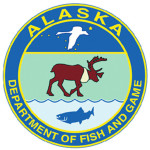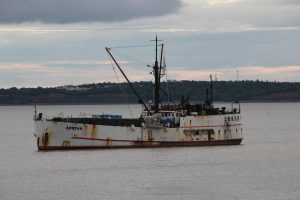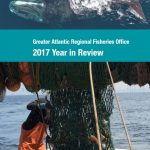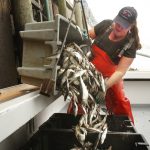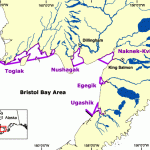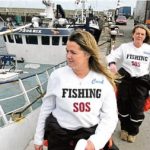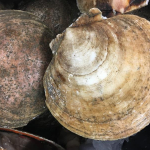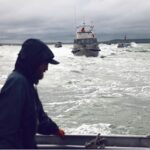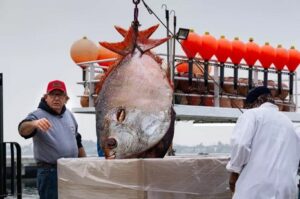Daily Archives: April 7, 2020
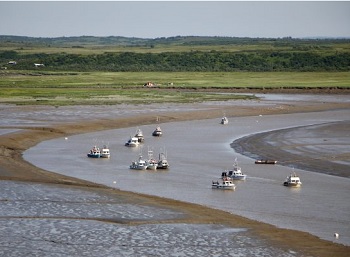
Coronavirus: Dillingham urges governor to close Bristol Bay fishery to protect the community
The City of Dillingham and the Curyung Tribal Council wrote a strongly worded letter to Governor Mike Dunleavy Monday urging him to consider closing Bristol Bay’s massive commercial fishery to protect the community from the coronavirus pandemic. Bristol Bay’s summer fishing season brings with it an influx of thousands of fishermen and processor workers into small communities around the region. The sockeye fishery is the largest in the world. Last year its preliminary ex-vessel value was the highest ever, at $306 million. In the letter, the tribe and the city said that there was no way to limit the communities’ exposure to the virus, even with the current requirement for processors to submit quarantine plans for their workers. >click to read< 17:05
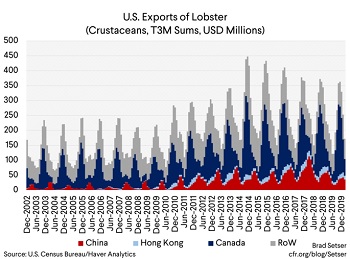
How Effective Have China’s Agricultural and Seafood Tariffs Been?
There is a case that viruses (bird flu, swine fever, and now the coronavirus) have had almost as big an impact on Chinese-American agricultural trade as the trade war. (And more than most want to know on trade in crustaceans) The actual impact of the tariff though isn’t always quite as clear as many think, Take chicken feet (or chicken paws). Guess what really led to a fall in U.S. exports of chicken paws? Bird Flu. There may be a lesson there. Now consider one of the more prominent—at least judging by the press coverage—industries that has been hit by Chinese retaliatory tariffs in the recent trade war: lobster. But there are, in fact, markets other than China for U.S. lobsters, and suppliers other than the United States for China. Given the large two-way trade in lobsters between the United States and Canada,,, >click to read< 16:21
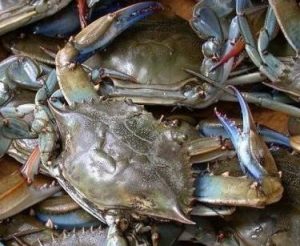
Coronavirus Assistance for Commercial Watermen and the Seafood Industry
The Hogan Administration acknowledges that the seafood industry is an iconic Maryland industry with commercial landing values over $82 million. The seafood industry also contributes over $600 million to Maryland’s economy. Given the economic hardships posed by the COVID-19 pandemic, commercial watermen who are self-employed may be eligible for the following relief programs: Small Business Administration (SBA) Paycheck Protection Program (PPP), Coronavirus Aid, Relief, and Economic Security (CARES) Act Relief Funding, more information, >click to read< 15:07

Coronavirus: Pop-up seafood market at Jersey Shore helps fishermen hurt by restaurant closures
A pop-up wholesale seafood market is helping to keep the fishing industry afloat in an Ocean County municipality. Point Pleasant Beach’s Shore Fresh Seafood Market is collaborating with the Fishermen’s Dock Cooperative to sell the catch — brought ashore on the docks directly behind the business — on its outdoor patio on Channel Drive.,, The next wholesale market is set for this Thursday through Sunday, 10 a.m. through 4 p.m. Offerings include sea bass, fluke, porgies, monk fish and sea scallops. more info, >click to read< 13:49
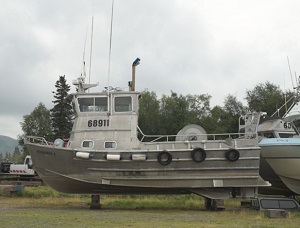
Coronavirus: Bristol Bay community leaders lay out minimum protocol needed to allow salmon season
Leaders of several major community organizations in Bristol Bay have issued a list of minimum protocols they expect to be in place before the commercial salmon fishery can take place this summer. Among other the protocol listed, fishermen and other seasonal workers would undergo a physical exam including a COVID-19 test with a negative result no more than 48 hours before traveling to the region. After arriving in Bristol Bay, the individuals would be transported to a quarantine location and remain in quarantine until a follow-up negative COVID-19 test is confirmed. The leaders listed out other expectations, including weekly health screenings, for the seafood industry to establish as minimum protocol for the 2020 season. >click to read< 11:12
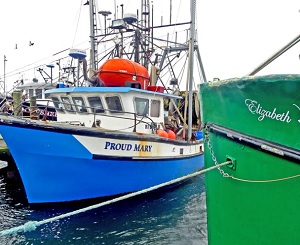
Coronavirus: Rhode Island’s commercial fishery and aquaculture industry hit hard
Until the COVID-19 pandemic, the Rhode Island aquaculture industry had been expanding. In 2019, the the total value of shellfish crops was $5.8 million and the industry employed about 200 people. Coastal Resources Management Council Aquaculture and Fisheries Coordinator David Beutel said the consequences of the evaporation of the major markets for shellfish are now being felt at all levels of the industry. “They can’t sell product because most of it goes to restaurants,” he said. The fin fishery is also suffering. Christopher Brown, executive director of the Rhode Island Commercial Fishermen’s Association, said the impact varied according to vessel size and catch. Social distancing is difficult, if not impossible, on a boat. >click to read< 10:17

Fishing groups wary of rapid offshore wind development plans
As offshore wind moves up the coast of New England, efforts are underway to make sure the region’s fishing interests have a seat at the table early in project development. An alliance of industry and academic stakeholders is promoting the need for research and best practices as offshore wind takes hold in waters where fishing has long been an economic anchor. Fishing groups have several concerns about the potential for boating obstacles and ecological impacts. A dearth of research makes the industry hesitant as it prepares for a slew of projects that could overwhelm their operations. Above all, fishing stakeholders want to be included from the start of wind project development. >click to read< 09:07
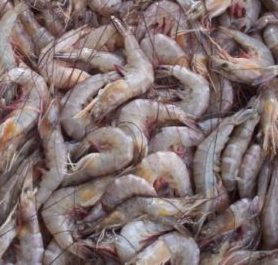
Louisiana Shrimp Association donates shrimp to Second Harvest Food Bank
A food pantry in New Orleans has received nearly 2,500 pounds of shrimp to help families in need during the COVID-19 pandemic. Second Harvest Food Bank is the recipient of the donation, announced Friday by Lt. Gov. Billy Nungesser and the Louisiana Seafood Promotion and Marketing Board. The donation, which will cover a few pounds each for families, was given by Ronnie Anderson and David and Kim Chauvin, owners of Bluewater Shrimp Company, based in Dulac, Louisiana. >click to read< 08:28

Coronavirus: Fed temporarily waves at-sea observer requirement on Canadian fishing vessels
The Department of Fisheries and Oceans (DFO) says the at-sea monitoring program poses a public health risk for both observers and crews on board. An order immediately suspending at-sea observer coverage was signed by federal Fisheries and Oceans Minister Bernadette Jordan on April 2 and will remain in effect for 45 days. Some inshore fisheries in Canada do not require at-sea observers, but they are now routinely present on larger vessels as a licensing condition in many Canadian fisheries. Fishing companies pick up the cost of the observers, who collect scientific data and monitor fishing activity and compliance with the rules. >click to read< 07:21

































